Unit 7 Chinese festivals 重难点精讲精练 (含答案)
文档属性
| 名称 | Unit 7 Chinese festivals 重难点精讲精练 (含答案) |
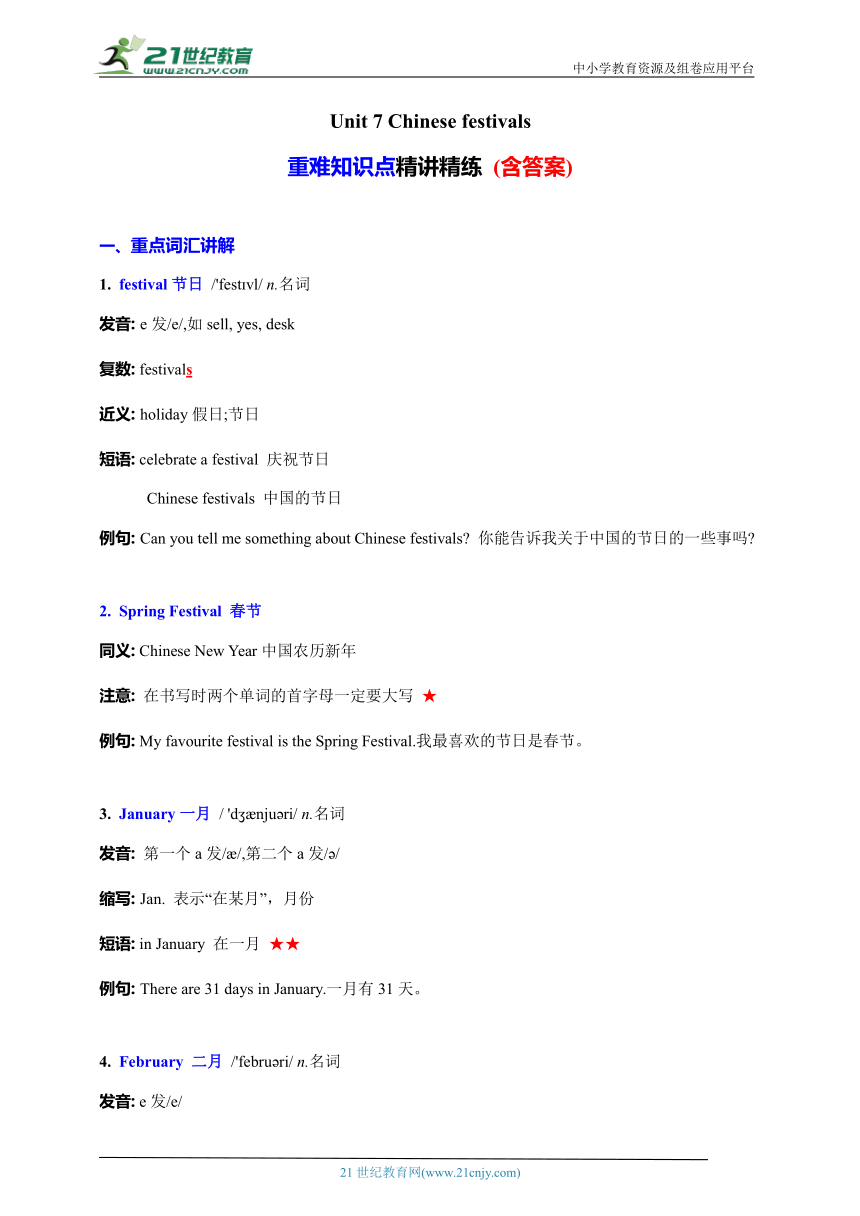
|
|
| 格式 | docx | ||
| 文件大小 | 312.6KB | ||
| 资源类型 | 试卷 | ||
| 版本资源 | 牛津译林版 | ||
| 科目 | 英语 | ||
| 更新时间 | 2024-05-16 20:23:43 | ||
图片预览

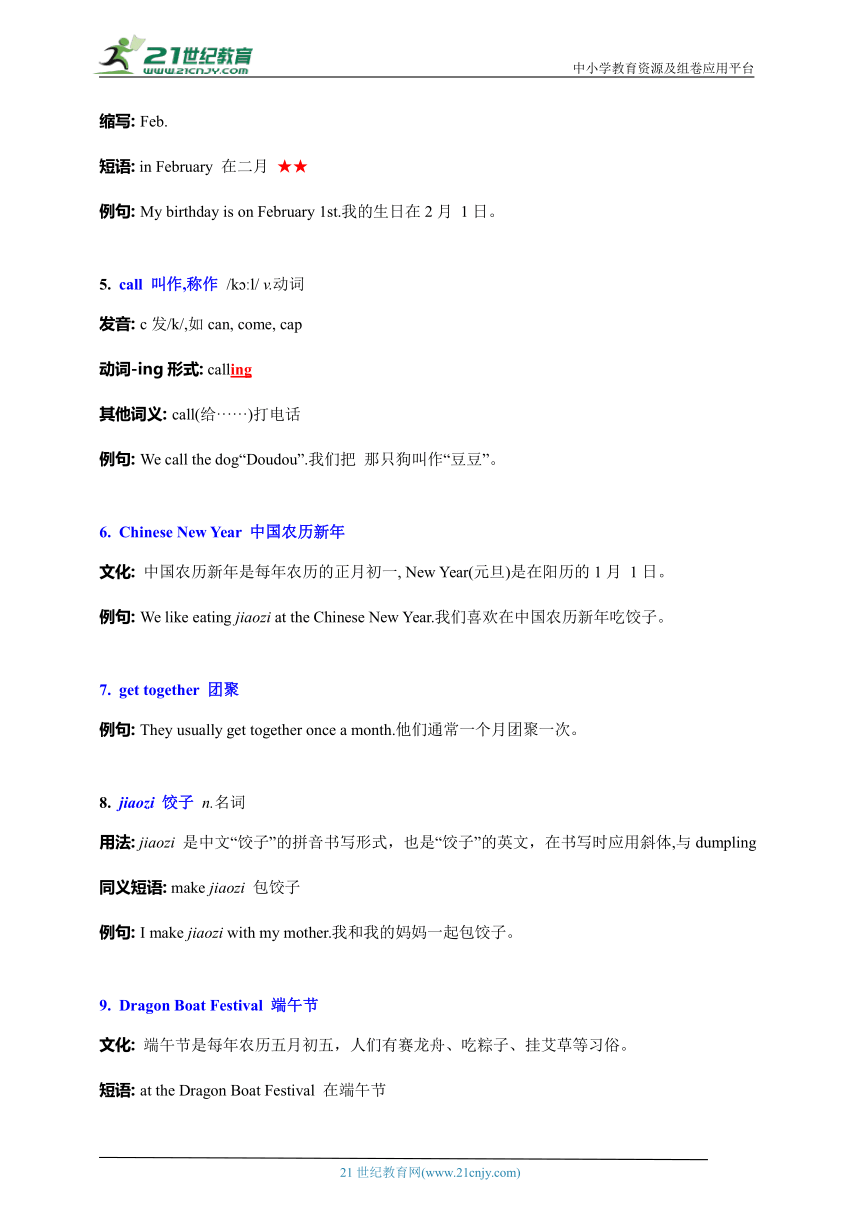
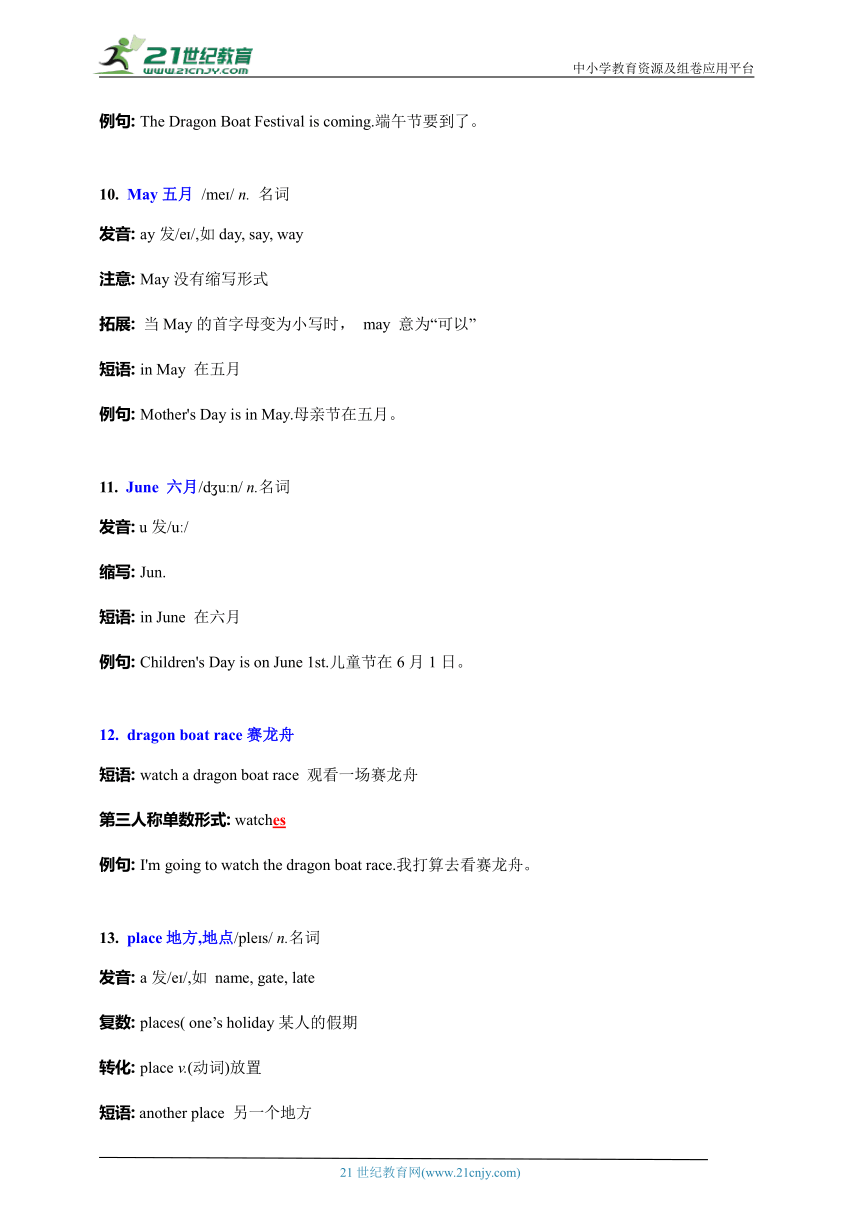
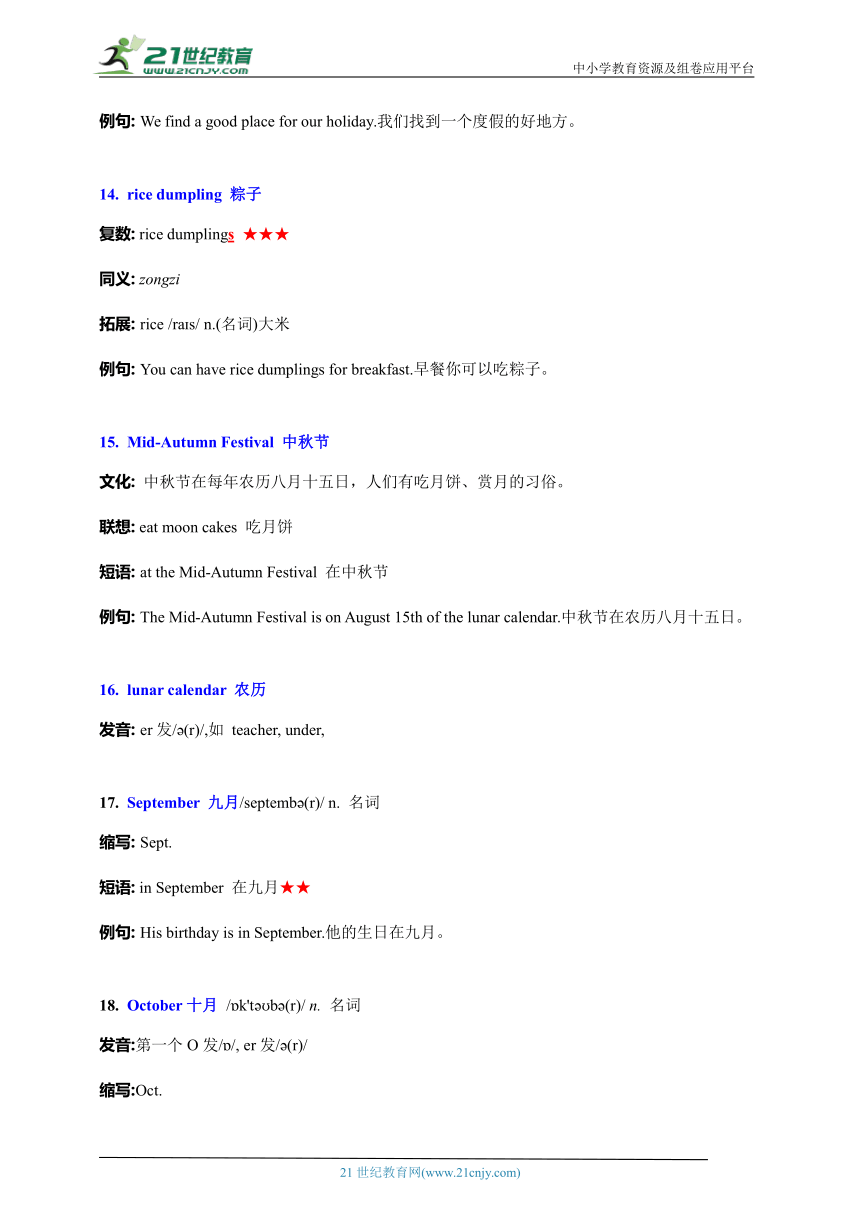
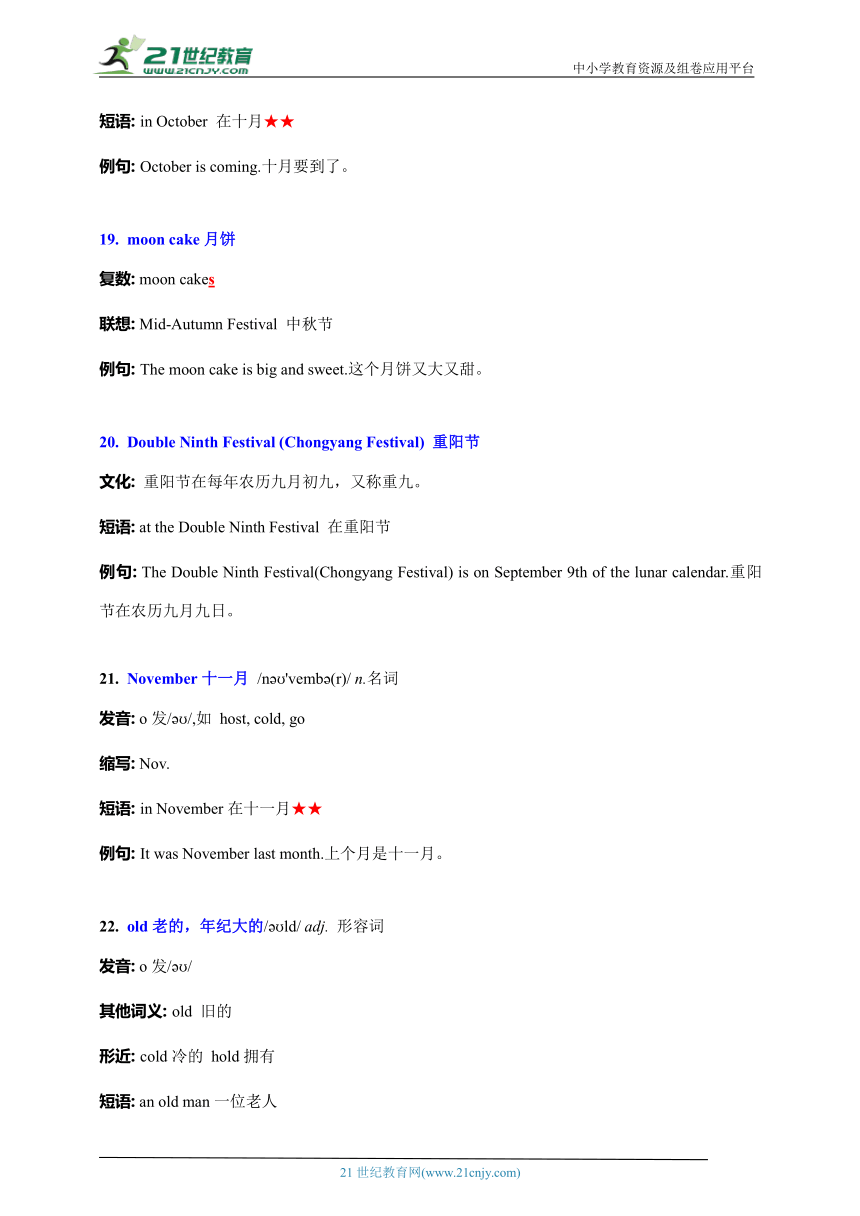
文档简介
中小学教育资源及组卷应用平台
Unit 7 Chinese festivals
重难知识点精讲精练 (含答案)
重点词汇讲解
festival节日 /'fest vl/ n.名词
发音: e发/e/,如sell, yes, desk
复数: festivals
近义: holiday假日;节日
短语: celebrate a festival 庆祝节日
Chinese festivals 中国的节日
例句: Can you tell me something about Chinese festivals 你能告诉我关于中国的节日的一些事吗
Spring Festival 春节
同义: Chinese New Year中国农历新年
注意: 在书写时两个单词的首字母一定要大写 ★
例句: My favourite festival is the Spring Festival.我最喜欢的节日是春节。
January一月 / 'd nju ri/ n.名词
发音: 第一个a发/ /,第二个a发/ /
缩写: Jan. 表示“在某月”,月份
短语: in January 在一月 ★★
例句: There are 31 days in January.一月有31天。
February 二月 /'febru ri/ n.名词
发音: e发/e/
缩写: Feb.
短语: in February 在二月 ★★
例句: My birthday is on February 1st.我的生日在2月 1日。
call 叫作,称作 /k l/ v.动词
发音: c发/k/,如can, come, cap
动词-ing形式: calling
其他词义: call(给······)打电话
例句: We call the dog“Doudou”.我们把 那只狗叫作“豆豆”。
Chinese New Year 中国农历新年
文化: 中国农历新年是每年农历的正月初一, New Year(元旦)是在阳历的1月 1日。
例句: We like eating jiaozi at the Chinese New Year.我们喜欢在中国农历新年吃饺子。
get together 团聚
例句: They usually get together once a month.他们通常一个月团聚一次。
jiaozi 饺子 n.名词
用法: jiaozi 是中文“饺子”的拼音书写形式,也是“饺子”的英文,在书写时应用斜体,与dumpling
同义短语: make jiaozi 包饺子
例句: I make jiaozi with my mother.我和我的妈妈一起包饺子。
Dragon Boat Festival 端午节
文化: 端午节是每年农历五月初五,人们有赛龙舟、吃粽子、挂艾草等习俗。
短语: at the Dragon Boat Festival 在端午节
例句: The Dragon Boat Festival is coming.端午节要到了。
May五月 /me / n. 名词
发音: ay发/e /,如day, say, way
注意: May没有缩写形式
拓展: 当May的首字母变为小写时, may 意为“可以”
短语: in May 在五月
例句: Mother's Day is in May.母亲节在五月。
June 六月/d u n/ n.名词
发音: u发/u /
缩写: Jun.
短语: in June 在六月
例句: Children's Day is on June 1st.儿童节在6月1日。
dragon boat race赛龙舟
短语: watch a dragon boat race 观看一场赛龙舟
第三人称单数形式: watches
例句: I'm going to watch the dragon boat race.我打算去看赛龙舟。
place地方,地点/ple s/ n.名词
发音: a发/e /,如 name, gate, late
复数: places( one’s holiday某人的假期
转化: place v.(动词)放置
短语: another place 另一个地方
例句: We find a good place for our holiday.我们找到一个度假的好地方。
rice dumpling 粽子
复数: rice dumplings ★★★
同义: zongzi
拓展: rice /ra s/ n.(名词)大米
例句: You can have rice dumplings for breakfast.早餐你可以吃粽子。
Mid-Autumn Festival 中秋节
文化: 中秋节在每年农历八月十五日,人们有吃月饼、赏月的习俗。
联想: eat moon cakes 吃月饼
短语: at the Mid-Autumn Festival 在中秋节
例句: The Mid-Autumn Festival is on August 15th of the lunar calendar.中秋节在农历八月十五日。
lunar calendar 农历
发音: er发/ (r)/,如 teacher, under,
September 九月/septemb (r)/ n. 名词
缩写: Sept.
短语: in September 在九月★★
例句: His birthday is in September.他的生日在九月。
October十月 / k't b (r)/ n. 名词
发音:第一个O发/ /, er发/ (r)/
缩写:Oct.
短语: in October 在十月★★
例句: October is coming.十月要到了。
moon cake月饼
复数: moon cakes
联想: Mid-Autumn Festival 中秋节
例句: The moon cake is big and sweet.这个月饼又大又甜。
Double Ninth Festival (Chongyang Festival) 重阳节
文化: 重阳节在每年农历九月初九,又称重九。
短语: at the Double Ninth Festival 在重阳节
例句: The Double Ninth Festival(Chongyang Festival) is on September 9th of the lunar calendar.重阳节在农历九月九日。
November十一月 /n 'vemb (r)/ n.名词
发音: o发/ /,如 host, cold, go
缩写: Nov.
短语: in November在十一月★★
例句: It was November last month.上个月是十一月。
old老的,年纪大的/ ld/ adj. 形容词
发音: o发/ /
其他词义: old 旧的
形近: cold冷的 hold拥有
短语: an old man一位老人
例句: The old man is reading newspapers.这位老人正在看报纸。
mountain 山,山脉/'ma nt n/ n. 名词
发音: ou发/a /,如 house, out, about
近义: hill 小山
巧记: mount(山;山峰)+ain=mountain
短语: climb mountains 爬山
例句: The children like climbing mountains in autumn.孩子们喜欢在秋天爬山。
rice cake重阳糕
复数: rice cakes
例句: I like eating rice cakes. 我喜欢吃重阳糕。
Mother’s Day母亲节
文化: 母亲节在每年五月的第二个星期日。
短语: on Mother's Day在母亲节
例句: Tomorrow is Mother’s Day.明天是母亲节。
Father's Day父亲节
文化: 父亲节在每年六月的第三个星期日。
短语: on Father's Day在父亲节
例句: Father's Day is coming.父亲节要到了。
favourite 最喜欢的 /'fe v r t/ adj.形容词
发音: a发/e /,如name, cake, race
注意: favourite 相当于 like…best,无最高级形式 ★★★
转化: favourite n.(名词)特别喜爱的人(或事物)
例句: My favourite season is winter.我最喜欢的季节是冬天。
重难点讲解
【解析】在世纪、年、月、季节等较长的时间前或泛指的“上午/下午/晚上”,要用介词in。
【拓展】在具体的某一天、在具体某一天的上午/下午/晚上或在星期名词和含有day的节日名称前,要用介词on。在钟点或具体的时刻前、在中午、在夜里、在午夜、在周末(也可用介词on)、在…岁或在含有festival的节日名称前,要用介词at。
【例句】(1)My birthday is in October. 我的生日在十月。
(2)Joe meets Nancy at school on Monday morning.
乔星期一早上在学校遇见南希。
(3)We make tangyuan at the Lantern Festival.
我们在元宵节做汤圆。
【练习】选词填空。
(1)I usually get up (in/on/at) half past seven (in/on/at)the morning.
(2)My family like lying in bed (in/on/at) Sunday morning.
【答案】(1)at,in (2)on
【解析】get together with意为“和…团聚”,with后可接名词或人称代词,如果后面接的是人称代词,人称代词要用其宾格形式。
此句中的families为family的复数形式,表示不同家庭的成员。
【拓展】family也可以表示“家人”,此时用作集体名词,后面的谓语动词用复数形式。它还可以表示整体概念的“家庭”,此时后面的谓语动词要用单数形式。
【例句】(1)I usually get together with my family at the Spring Festival.
我通常在春节和我的家人团聚。
(2)All my family have a picnic in the natural park.
我们全家在自然公园里野餐。
(3)John has a big family. 约翰有一个大家庭。
【练习】(1)根据中文提示完成句子。
他们只是想回到他们的家人身边。
They just return to their .
(2)改错。
( )On Sundays, we always get together and our grandparents.
A B C
【答案】(l)want to, families (2)C with
【解析】look at the moon意为“赏月”,相当于watch the moon。
at night意为“在夜里”,它表示的时间比in the evening(在晚上)表示的时间要晚些。
【例句】(l)I usually look at the moon at the Mid-Autumn Festival,
我通常在中秋节赏月。
(2)Bats always work at night.蝙蝠总是在夜里工作。
(3)My family usually take a walk in the park in the evening
我的家人通常晚上在公园里散步。
【练习】按要求完成句子。
Would you like to watch the moon with me tonight (改为同义句)
Would you like to the moon with me tonight
【答案】look at
【解析】此句中的for为介词,意为“给,对,供”,表示对象。
【例句】Women's Day is a day for women,妇女节是一个给妇女们的节日。
【练习】根据中文提示完成句子。
这是一本儿童读物。
This is .
【答案】a book for children
【解析】Mother's为名词所有格,意为“母亲的”,表示所属关系。
【拓展】(1)在表示“…的”名词所有格时,一般直接在名词后加“s”;但如果是以s结尾的复数名词,则只需在名词后加“’”。
(2)母亲节和父亲节是孩子们专为自己的母亲和父亲庆祝的节日,所以这两个节日的节日名称不同于教师节等节日的节日名称是由“可数名词复数的所有格+Day”构成,而是要用“可数名词单数的所有格+Day”构成,且节日名称中的每个单词的首字母都要大写。
【例句】(1)Children's Day is on the first of June.儿童节在6月l日。
(2)My parents' bedroom is next to the bathroom.我父母的卧室在洗手间旁边。
【练习】单项选择。
( )What do you usually do for your father on Day
A.Father B.Father's C.Fathers
【答案】B
【解析】give为及物动词,后面必须接宾语。give sb sth意为“给某人某物”,相当于give sth to sb。当sb和sth均为代词的宾格形式时,只能用give sth to sb这一结构。
【例句】(1)Mr Green gives me a book. = Mr Green gives a book to me.
格林老师给我一本书。
(2)Please give it to him as soon as possible.请尽快将它给他。
【练习】按要求完成句子。
My mother gives her some snacks at the party.(改为同义句)
My mother at the party.
【答案】gives some snacks to her
【解析】talk about sth意为“谈论某事”,talk about后也可以接被谈论的人,即talk about sb。
【拓展】talk to sb意为“和某人谈话”,talk with sb意为“与某人交谈”,talk with sb about sth意为“和某人谈论某事”,相当于talk about sth with sb。
【例句】(1)We often talk about our hobbies/,the stars together.
我们经常一起谈论我们的业余爱好/那些明星。
(2)Mrs Brown is talking with her friends at the cafe.
布朗夫人正在咖啡馆里和她的朋友们交谈。
【练习】根据中文提示完成句子。
学生们正在和他们的老师谈论聚会的情况。
The students the party their teacher.
【答案】are talking about, with
第二部分:易错易混全解
易混淆family,house和home的用法
【例题】从方框中选择合适的单词填空。
family house home
Linda always gets together with her at weekends.
I live in a new now.Welcome to my new .
【答案】(1)family (2)house, home
点拨:family,house和home都有“家”的意思,三者的区别在于,family意为“家,家庭”,指构成一个家庭的全体成员,与家里的房子无关;house意为“房子”,指家里人居住的房子,不带感彩;home意为“家”,具有感彩,侧重指家人共同生活的场所,它还有“家乡;故乡”的意思。题(1),句子想表达的是“琳达总是在周末和她的家人团聚”,故填family。题(2),句子想表达的是“我现在住在一栋新房子里。欢迎来我的新家”,故填house,home。
易混淆介词in,on和at在表示时间时的用法
【例题】改错。
( )1.We can fly kites on spring.
A B C
( )2.They have breakfast in eight thirty.
A B C
( )3.My birthday is at the 28th of February.
A B C
【答案】1.C in 2.B at 3.A on
点拨:题(l),spring意为“春天,春季”,季节名词前用介词in,故选C,将on改为in。题(2),eight thirty是一个具体的时刻,在具体的时刻前用介词at,故选B,将in改为at。题(3),the 28th of February意为“2月28日”,在具体的日期前用介词on,故选A,将at改为on。
21世纪教育网 www.21cnjy.com 精品试卷·第 2 页 (共 2 页)
21世纪教育网(www.21cnjy.com)
Unit 7 Chinese festivals
重难知识点精讲精练 (含答案)
重点词汇讲解
festival节日 /'fest vl/ n.名词
发音: e发/e/,如sell, yes, desk
复数: festivals
近义: holiday假日;节日
短语: celebrate a festival 庆祝节日
Chinese festivals 中国的节日
例句: Can you tell me something about Chinese festivals 你能告诉我关于中国的节日的一些事吗
Spring Festival 春节
同义: Chinese New Year中国农历新年
注意: 在书写时两个单词的首字母一定要大写 ★
例句: My favourite festival is the Spring Festival.我最喜欢的节日是春节。
January一月 / 'd nju ri/ n.名词
发音: 第一个a发/ /,第二个a发/ /
缩写: Jan. 表示“在某月”,月份
短语: in January 在一月 ★★
例句: There are 31 days in January.一月有31天。
February 二月 /'febru ri/ n.名词
发音: e发/e/
缩写: Feb.
短语: in February 在二月 ★★
例句: My birthday is on February 1st.我的生日在2月 1日。
call 叫作,称作 /k l/ v.动词
发音: c发/k/,如can, come, cap
动词-ing形式: calling
其他词义: call(给······)打电话
例句: We call the dog“Doudou”.我们把 那只狗叫作“豆豆”。
Chinese New Year 中国农历新年
文化: 中国农历新年是每年农历的正月初一, New Year(元旦)是在阳历的1月 1日。
例句: We like eating jiaozi at the Chinese New Year.我们喜欢在中国农历新年吃饺子。
get together 团聚
例句: They usually get together once a month.他们通常一个月团聚一次。
jiaozi 饺子 n.名词
用法: jiaozi 是中文“饺子”的拼音书写形式,也是“饺子”的英文,在书写时应用斜体,与dumpling
同义短语: make jiaozi 包饺子
例句: I make jiaozi with my mother.我和我的妈妈一起包饺子。
Dragon Boat Festival 端午节
文化: 端午节是每年农历五月初五,人们有赛龙舟、吃粽子、挂艾草等习俗。
短语: at the Dragon Boat Festival 在端午节
例句: The Dragon Boat Festival is coming.端午节要到了。
May五月 /me / n. 名词
发音: ay发/e /,如day, say, way
注意: May没有缩写形式
拓展: 当May的首字母变为小写时, may 意为“可以”
短语: in May 在五月
例句: Mother's Day is in May.母亲节在五月。
June 六月/d u n/ n.名词
发音: u发/u /
缩写: Jun.
短语: in June 在六月
例句: Children's Day is on June 1st.儿童节在6月1日。
dragon boat race赛龙舟
短语: watch a dragon boat race 观看一场赛龙舟
第三人称单数形式: watches
例句: I'm going to watch the dragon boat race.我打算去看赛龙舟。
place地方,地点/ple s/ n.名词
发音: a发/e /,如 name, gate, late
复数: places( one’s holiday某人的假期
转化: place v.(动词)放置
短语: another place 另一个地方
例句: We find a good place for our holiday.我们找到一个度假的好地方。
rice dumpling 粽子
复数: rice dumplings ★★★
同义: zongzi
拓展: rice /ra s/ n.(名词)大米
例句: You can have rice dumplings for breakfast.早餐你可以吃粽子。
Mid-Autumn Festival 中秋节
文化: 中秋节在每年农历八月十五日,人们有吃月饼、赏月的习俗。
联想: eat moon cakes 吃月饼
短语: at the Mid-Autumn Festival 在中秋节
例句: The Mid-Autumn Festival is on August 15th of the lunar calendar.中秋节在农历八月十五日。
lunar calendar 农历
发音: er发/ (r)/,如 teacher, under,
September 九月/septemb (r)/ n. 名词
缩写: Sept.
短语: in September 在九月★★
例句: His birthday is in September.他的生日在九月。
October十月 / k't b (r)/ n. 名词
发音:第一个O发/ /, er发/ (r)/
缩写:Oct.
短语: in October 在十月★★
例句: October is coming.十月要到了。
moon cake月饼
复数: moon cakes
联想: Mid-Autumn Festival 中秋节
例句: The moon cake is big and sweet.这个月饼又大又甜。
Double Ninth Festival (Chongyang Festival) 重阳节
文化: 重阳节在每年农历九月初九,又称重九。
短语: at the Double Ninth Festival 在重阳节
例句: The Double Ninth Festival(Chongyang Festival) is on September 9th of the lunar calendar.重阳节在农历九月九日。
November十一月 /n 'vemb (r)/ n.名词
发音: o发/ /,如 host, cold, go
缩写: Nov.
短语: in November在十一月★★
例句: It was November last month.上个月是十一月。
old老的,年纪大的/ ld/ adj. 形容词
发音: o发/ /
其他词义: old 旧的
形近: cold冷的 hold拥有
短语: an old man一位老人
例句: The old man is reading newspapers.这位老人正在看报纸。
mountain 山,山脉/'ma nt n/ n. 名词
发音: ou发/a /,如 house, out, about
近义: hill 小山
巧记: mount(山;山峰)+ain=mountain
短语: climb mountains 爬山
例句: The children like climbing mountains in autumn.孩子们喜欢在秋天爬山。
rice cake重阳糕
复数: rice cakes
例句: I like eating rice cakes. 我喜欢吃重阳糕。
Mother’s Day母亲节
文化: 母亲节在每年五月的第二个星期日。
短语: on Mother's Day在母亲节
例句: Tomorrow is Mother’s Day.明天是母亲节。
Father's Day父亲节
文化: 父亲节在每年六月的第三个星期日。
短语: on Father's Day在父亲节
例句: Father's Day is coming.父亲节要到了。
favourite 最喜欢的 /'fe v r t/ adj.形容词
发音: a发/e /,如name, cake, race
注意: favourite 相当于 like…best,无最高级形式 ★★★
转化: favourite n.(名词)特别喜爱的人(或事物)
例句: My favourite season is winter.我最喜欢的季节是冬天。
重难点讲解
【解析】在世纪、年、月、季节等较长的时间前或泛指的“上午/下午/晚上”,要用介词in。
【拓展】在具体的某一天、在具体某一天的上午/下午/晚上或在星期名词和含有day的节日名称前,要用介词on。在钟点或具体的时刻前、在中午、在夜里、在午夜、在周末(也可用介词on)、在…岁或在含有festival的节日名称前,要用介词at。
【例句】(1)My birthday is in October. 我的生日在十月。
(2)Joe meets Nancy at school on Monday morning.
乔星期一早上在学校遇见南希。
(3)We make tangyuan at the Lantern Festival.
我们在元宵节做汤圆。
【练习】选词填空。
(1)I usually get up (in/on/at) half past seven (in/on/at)the morning.
(2)My family like lying in bed (in/on/at) Sunday morning.
【答案】(1)at,in (2)on
【解析】get together with意为“和…团聚”,with后可接名词或人称代词,如果后面接的是人称代词,人称代词要用其宾格形式。
此句中的families为family的复数形式,表示不同家庭的成员。
【拓展】family也可以表示“家人”,此时用作集体名词,后面的谓语动词用复数形式。它还可以表示整体概念的“家庭”,此时后面的谓语动词要用单数形式。
【例句】(1)I usually get together with my family at the Spring Festival.
我通常在春节和我的家人团聚。
(2)All my family have a picnic in the natural park.
我们全家在自然公园里野餐。
(3)John has a big family. 约翰有一个大家庭。
【练习】(1)根据中文提示完成句子。
他们只是想回到他们的家人身边。
They just return to their .
(2)改错。
( )On Sundays, we always get together and our grandparents.
A B C
【答案】(l)want to, families (2)C with
【解析】look at the moon意为“赏月”,相当于watch the moon。
at night意为“在夜里”,它表示的时间比in the evening(在晚上)表示的时间要晚些。
【例句】(l)I usually look at the moon at the Mid-Autumn Festival,
我通常在中秋节赏月。
(2)Bats always work at night.蝙蝠总是在夜里工作。
(3)My family usually take a walk in the park in the evening
我的家人通常晚上在公园里散步。
【练习】按要求完成句子。
Would you like to watch the moon with me tonight (改为同义句)
Would you like to the moon with me tonight
【答案】look at
【解析】此句中的for为介词,意为“给,对,供”,表示对象。
【例句】Women's Day is a day for women,妇女节是一个给妇女们的节日。
【练习】根据中文提示完成句子。
这是一本儿童读物。
This is .
【答案】a book for children
【解析】Mother's为名词所有格,意为“母亲的”,表示所属关系。
【拓展】(1)在表示“…的”名词所有格时,一般直接在名词后加“s”;但如果是以s结尾的复数名词,则只需在名词后加“’”。
(2)母亲节和父亲节是孩子们专为自己的母亲和父亲庆祝的节日,所以这两个节日的节日名称不同于教师节等节日的节日名称是由“可数名词复数的所有格+Day”构成,而是要用“可数名词单数的所有格+Day”构成,且节日名称中的每个单词的首字母都要大写。
【例句】(1)Children's Day is on the first of June.儿童节在6月l日。
(2)My parents' bedroom is next to the bathroom.我父母的卧室在洗手间旁边。
【练习】单项选择。
( )What do you usually do for your father on Day
A.Father B.Father's C.Fathers
【答案】B
【解析】give为及物动词,后面必须接宾语。give sb sth意为“给某人某物”,相当于give sth to sb。当sb和sth均为代词的宾格形式时,只能用give sth to sb这一结构。
【例句】(1)Mr Green gives me a book. = Mr Green gives a book to me.
格林老师给我一本书。
(2)Please give it to him as soon as possible.请尽快将它给他。
【练习】按要求完成句子。
My mother gives her some snacks at the party.(改为同义句)
My mother at the party.
【答案】gives some snacks to her
【解析】talk about sth意为“谈论某事”,talk about后也可以接被谈论的人,即talk about sb。
【拓展】talk to sb意为“和某人谈话”,talk with sb意为“与某人交谈”,talk with sb about sth意为“和某人谈论某事”,相当于talk about sth with sb。
【例句】(1)We often talk about our hobbies/,the stars together.
我们经常一起谈论我们的业余爱好/那些明星。
(2)Mrs Brown is talking with her friends at the cafe.
布朗夫人正在咖啡馆里和她的朋友们交谈。
【练习】根据中文提示完成句子。
学生们正在和他们的老师谈论聚会的情况。
The students the party their teacher.
【答案】are talking about, with
第二部分:易错易混全解
易混淆family,house和home的用法
【例题】从方框中选择合适的单词填空。
family house home
Linda always gets together with her at weekends.
I live in a new now.Welcome to my new .
【答案】(1)family (2)house, home
点拨:family,house和home都有“家”的意思,三者的区别在于,family意为“家,家庭”,指构成一个家庭的全体成员,与家里的房子无关;house意为“房子”,指家里人居住的房子,不带感彩;home意为“家”,具有感彩,侧重指家人共同生活的场所,它还有“家乡;故乡”的意思。题(1),句子想表达的是“琳达总是在周末和她的家人团聚”,故填family。题(2),句子想表达的是“我现在住在一栋新房子里。欢迎来我的新家”,故填house,home。
易混淆介词in,on和at在表示时间时的用法
【例题】改错。
( )1.We can fly kites on spring.
A B C
( )2.They have breakfast in eight thirty.
A B C
( )3.My birthday is at the 28th of February.
A B C
【答案】1.C in 2.B at 3.A on
点拨:题(l),spring意为“春天,春季”,季节名词前用介词in,故选C,将on改为in。题(2),eight thirty是一个具体的时刻,在具体的时刻前用介词at,故选B,将in改为at。题(3),the 28th of February意为“2月28日”,在具体的日期前用介词on,故选A,将at改为on。
21世纪教育网 www.21cnjy.com 精品试卷·第 2 页 (共 2 页)
21世纪教育网(www.21cnjy.com)
